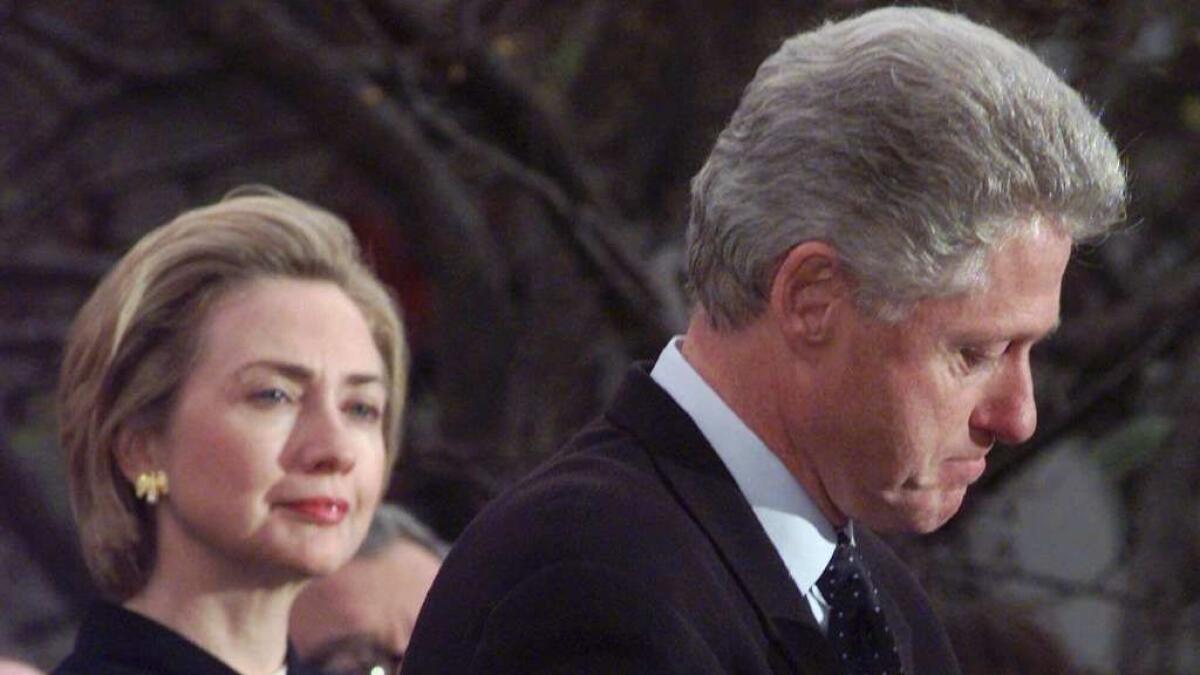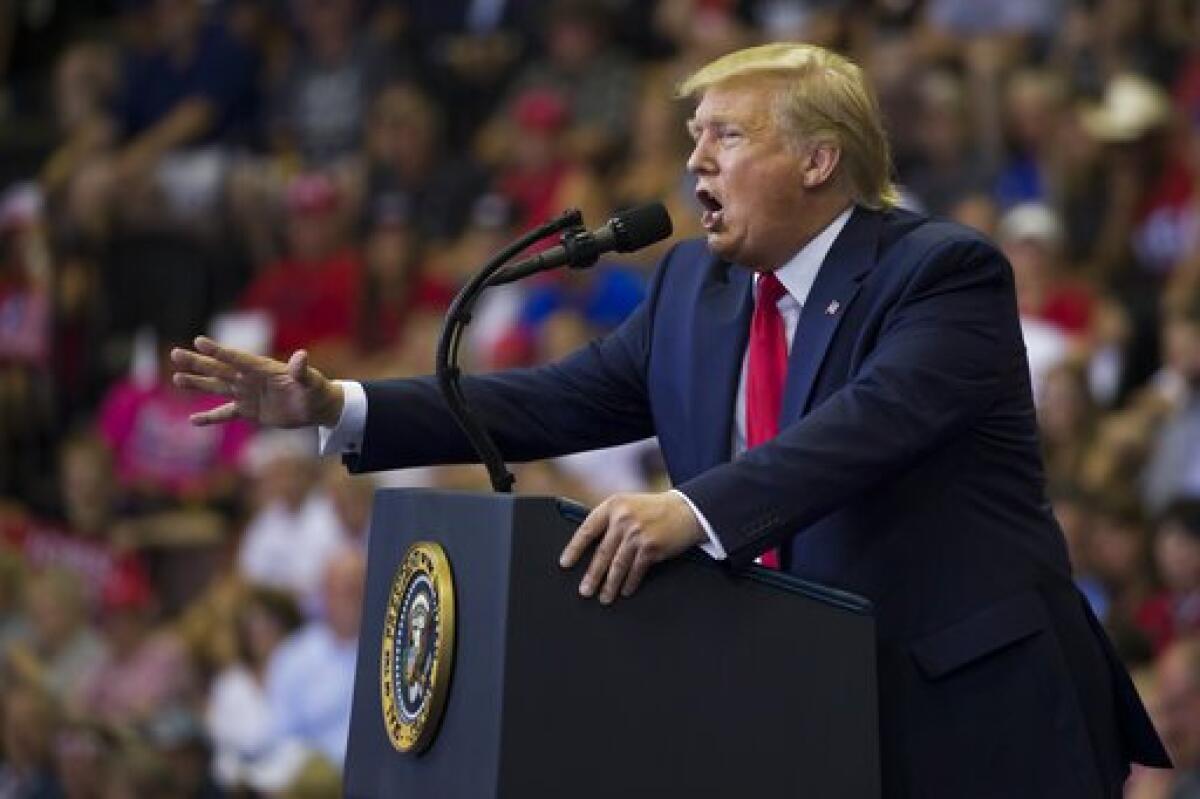Watergate was a TV spectacle. Just wait for the reboot: Trump
He sat in a tan suit and a blue shirt. His mouth pressed close to a silver microphone. His words came slowly, as if each was climbing out from beneath a great weight. Sweat glistened on his forehead. Men peered at him from across a green tablecloth. They wanted answers. The man spoke, and the nation slipped to a darker place.
“I began by telling the president that there was a cancer growing on the presidency and if the cancer was not removed the president himself would be killed by it,” John Dean, former White House counsel, said during the 1973 Senate Watergate hearings that would undo the presidency of Richard M. Nixon. Dean’s testimony was stunning, a TV moment crystallized for the ages.
It was a time before round-the-clock news, Twitter, YouTube and Facebook feeds, a time when CBS news anchor Walter Cronkite was America’s trusted distiller of truth. The gravity of events back then cut in deep and lingered. So unlike today, when countless screens and endless streaming bring us the impeachment inquiry into President Trump in warp speed so atomized that it’s disorienting. We are at once riveted and weary, a country numbed by the gifts of technology and a president whose audacity is more incendiary and mercurial than Nixon’s seething.
“It’s tabloid culture and sensational news and Trump has learned to say bravado things unbacked by facts, and if you throw them out there enough you confuse people,” said Douglas Brinkley, a presidential historian and professor at Rice University. “It’s two different worlds. In Watergate in the ’70s you still had bipartisanship on Capitol Hill. People would go to dinner parties with each other. There was a sense of official Washington versus Richard Nixon. But in this case, it’s the media lining up on one side or the other and there’s a kind of mass confusion out there.”
The Watergate hearings, which stretched into 1974, played like Shakespeare spliced with courtroom drama: riffling papers, conspirators, men in the wings and the penetrating southern drawl of Sen. Sam Ervin, which reverberated with moral urgency. The country had watched the Vietnam War and race riots on TV, but it was, in some ways, unwilling to accept or not yet inured to the failures of its creeds and the duplicity of its leaders. Misdeeds and corruption still had places to hide, although they were diminishing.
One could ask, without irony, as Sen. Howard Baker did during the Watergate hearings: “What did the president know, and when did he know it?” It was riveting TV in a decade when most people watched only three channels and “platforms” were meant for diving and “trolls” were creatures beneath bridges.

The 1998 impeachment of President Clinton was as consuming and tawdry as second-rate burlesque. The charges of “high crimes and misdemeanors” brought against him stemmed from accusations of his obstructing justice and lying under oath in a sexual harassment lawsuit filed by Paula Jones. Clinton railed, fumed and went after his opponents in a foreshadowing of the deepening political divisions between left and right and the accelerating insatiability of the media to feed on scandal.
Enter Trump. He curses, tweets, threatens, wants his opponents tried for treason. Like a Netflix series bristling with intrigue and odd asides — a whistleblower, henchmen and a Ukrainian president who was once a comedian — Trump is a master at shifting narratives. He is a one-man storm, a businessman-turned-politician-turned-cable news windfall. He is as much a part of his era as Cronkite was of his, and the arc between them reveals how our need for veracity has often succumbed to rage and spin.

Speaking in the Oval Office this week, Trump attacked Rep. Adam B. Schiff (D-Burbank), chairman of the House Intelligence Committee, which is investigating whether the president pressured Ukraine for political gain. “He should resign from office in disgrace and, frankly,” Trump said of Schiff, “they should look at him for treason cause he is making up the words of the president of the United States, not only words, but the meaning. It’s a disgrace. It should not be allowed to happen... He’s a shifty, dishonest guy.”
“I think this president is going to make Richard Nixon look like a choir boy,” Dean said a recent town hall meeting in Union City. “Cover-ups just don’t work.”
Trump, like Nixon, views the media as plotting against him. The president’s “fake news” attacks would have fit neatly into Nixon’s script, but unlike his predecessor Trump does not shy from the lens so much as embrace it, as if he could bend facts to his will. As the Watergate hearings intensified, and public opinion was sliding against him, Nixon had few refuges in a limited media world. Trump has an array of outlets, including right-wing blogs, Fox News and talk radio hosts, such Rush Limbaugh, who can carry the message to his base that he is the victim of a “deep state” conspiracy.
From battles over the size of the crowd at his inauguration to the Mueller investigation on Russia’s influence in the 2016 election, Trump, even as he has given late show writers grist for parody and satire, has endured. He is the product of a time when the threshold for shame is high and people, from Instagrammers to chief executives, can create their own narratives. He is the personification of an era of holograms and false equivalencies. But some believe the Ukraine affair is the most potent threat to his presidency.
“Perhaps the most shocking part of all this is it might actually hurt him,” John Oliver said on his “Last Week Tonight” show. “And I know you’re probably thinking right now, ‘No, it won’t, you [expletive] idiot! Nothing Trump does ever affects him.’ And I do get that. That has clearly been true — until, maybe, now.”
After Dean’s Watergate testimony, Nixon’s hold on his office began unraveling. The TV drama kept the nation riveted by revelations of bugging equipment, tapes, plumbers (a clandestine group within the Nixon administration), the burglary of the National Democratic Committee, lies and a president who could no longer rise above the tide against him. In 1974, the House Judiciary Committee approved three articles impeachment, including abuse of power.
“Make no mistake about it,” Rep. Peter W. Rodino Jr. said at the time. “This is a turning point, whatever we decide.”
Nixon resigned before a full House vote on the articles. He crossed the White House lawn and flew away in a helicopter.
Don’t expect as clean an ending to the latest season of Impeachment: The Trumpian Drama.
More to Read
The biggest entertainment stories
Get our big stories about Hollywood, film, television, music, arts, culture and more right in your inbox as soon as they publish.
You may occasionally receive promotional content from the Los Angeles Times.











